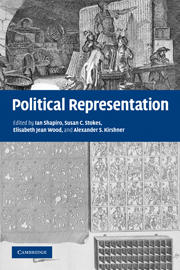Book contents
- Frontmatter
- Contents
- List of figures
- List of tables
- List of contributors
- Preface
- Editors' introduction
- Part I Representation before representative democracy
- 1 Hobbes's theory of representation: anti-democratic or proto-democratic?
- 2 Participation and representation before democracy: petitions and addresses in premodern Britain
- Part II Theories of political representation
- Part III Representation and inherited injustice
- Part IV What role for representative quotas?
- Part V Preferences, persuasion, and democratic representation
- Index
- References
2 - Participation and representation before democracy: petitions and addresses in premodern Britain
Published online by Cambridge University Press: 05 June 2012
- Frontmatter
- Contents
- List of figures
- List of tables
- List of contributors
- Preface
- Editors' introduction
- Part I Representation before representative democracy
- 1 Hobbes's theory of representation: anti-democratic or proto-democratic?
- 2 Participation and representation before democracy: petitions and addresses in premodern Britain
- Part II Theories of political representation
- Part III Representation and inherited injustice
- Part IV What role for representative quotas?
- Part V Preferences, persuasion, and democratic representation
- Index
- References
Summary
Participation and representation are often taken to be alternative forms of popular rule. This chapter nevertheless suggests that, in predemocractic Britain, they were not mutually exclusive, and investigates the informal and participatory ways in which representation occurred outside the formal process of election. In particular it will focus on the mass of petitions and addresses that were presented to both parliament and crown from the seventeenth through to the nineteenth centuries. These not only claimed to represent the people's views but also procured their active participation by obtaining their signatures and by stimulating public debate. Indeed, analysis of the petitions and addresses, and of the debates that they provoked, shows that there was often an ongoing, creative, and dynamic interaction between the represented and their elected representatives. Representation did not end at the moment of parliamentary electoral authorization; and public opinion operated before the advent of democracy. This historical evidence should affect our understanding of the nature of representation and popular rule, both at a theoretical and at a practical level.
One view of representation argues that the represented transfer power to a representative and thus have little political role thereafter, being deemed to consent to what is done in their name. This was essentially the view of Thomas Hobbes in the seventeenth century, who argued that the people transferred all their power to the representative person or assembly, “the great Leviathan,” who was the authorized and exclusive but also the “absolute” representative.
- Type
- Chapter
- Information
- Political Representation , pp. 35 - 58Publisher: Cambridge University PressPrint publication year: 2010
References
- 5
- Cited by

